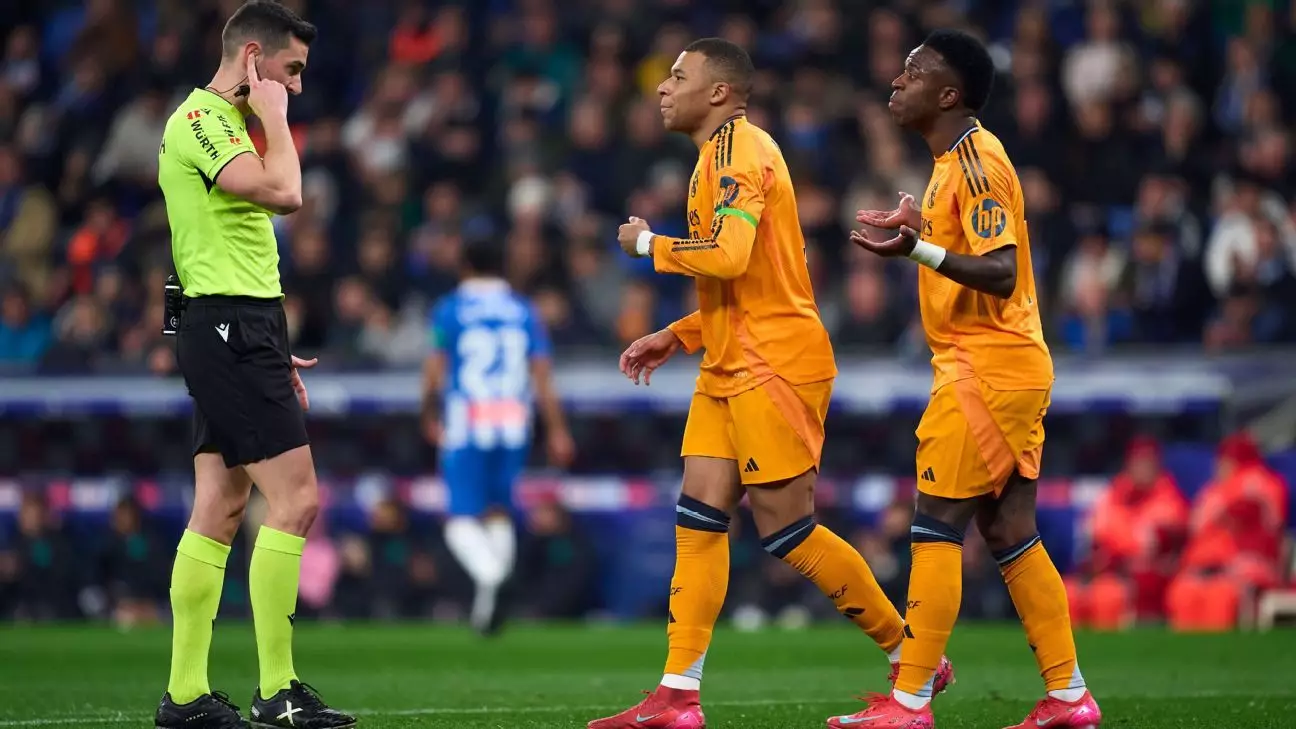The world of football often finds itself entangled in disputes that often result from controversial officiating decisions. Recently, Real Madrid, one of the most storied clubs in football history, raised the stakes by directly questioning the integrity of Spain’s refereeing system following a loss to Espanyol in LaLiga. This contentious episode has stirred significant debate within the footballing community, revealing an underlying tension between influential clubs and the governing bodies of the sport.
In the aftermath of their narrow 1-0 defeat to Espanyol, Real Madrid lodged a formal complaint against referee Alejandro Muñiz Ruiz for what they deemed a critical oversight: the failure to issue a red card to Espanyol’s Carlos Romero after a reckless challenge on superstar Kylian Mbappé. As the match unfolded, Romero not only escaped punishment but went on to score the decisive goal. This prompted Madrid to take action, sending an open letter to the Royal Spanish Football Federation (RFEF) demanding access to the VAR audio concerning the controversial incident.
This complaint accused the referees of “manipulating and adulterating” the competition and suggested that the officiating system in Spain was fundamentally flawed. Such accusations are not to be taken lightly, as they can erosion public trust in football governance and increase scrutiny on the integrity of matches. The RFEF, understandably, responded indignantly to the claims, denying any wrongdoing and defending the universally accepted professional standards that referees adhere to.
On a subsequent Monday, key figures from Real Madrid, including their director general José Ángel Sánchez and board secretary José Luis del Valle, convened with the head of Spain’s technical committee of referees, Luis Medina Cantalejo, at RFEF’s headquarters in Las Rozas. The meeting aimed to address Madrid’s grievances, particularly regarding the VAR decision-making process. Cantalejo indicated that discussions were conducted in a cordial atmosphere, marking a contrast to what might be expected in such confrontational contexts.
This dialogue stood out as a pivotal moment aimed at restoring mutual respect and understanding. Cantalejo mentioned that while some matters discussed were private to the committee, they were committed to transparency. Such engagements are vital, as they allow clubs to articulate their concerns, while also providing governing bodies the platform to clarify their procedures and decision-making processes. However, discussions alone cannot mend the strained relations if they do not yield constructive changes in officiating standards.
Madrid’s grievances extend beyond the match against Espanyol. The club has expressed dissatisfaction with refereeing decisions in their previous fixtures, particularly in games against Atlético Madrid and Osasuna. Head Coach Carlo Ancelotti, while addressing the media, noted an alarming trend of controversial officiating in recent matches. His fears were echoed in whispers around the footballing community that all might not be well with officiating consistency in Spain’s top tier.
The implications of poor refereeing are far-reaching, resonating through the league’s integrity and fans’ trust. These recurrent complaints from a powerhouse like Real Madrid highlight an episodic crisis that could demand introspection and a reevaluation of how refereeing is managed across Spain. Furthermore, it raises critical questions about the effectiveness of the VAR system—designed to enhance officiating accuracy but, in certain instances, exacerbating feelings of injustice among clubs and fans alike.
What does this tumultuous episode signify for Real Madrid and the larger footballing landscape in Spain? The club’s insistence on addressing refereeing quality suggests a potential call for sweeping reforms. For the RFEF, the interaction serves as both a warning and an opportunity to reassess its practices to maintain credibility. Should the current patterns persist without a concrete response from the governing body, the path to improving the image of Spanish football—especially in the eyes of its most prominent clubs—will become even more challenging.
The tension between Real Madrid and RFEF remains a reflection of larger issues at play in football officiating globally. Transparency, dialogue, and systematic change will be crucial in addressing these grievances, ensuring that the beautiful game preserves its integrity and fairness for all involved.

